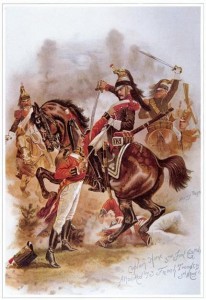Lt. Col. Francis Home M.D.
Francis Home was born in Edinburgh in 1780, the 2nd son of Prof. Francis Home (1719-1813) who was Head of Medicine at Edinburgh University.
He graduated as a Doctor of Medicine from Edinburgh on the 24th June 1800 and joined the Army as a physician in 1801. In 1802 he left and rejoined the Army with the 1st Battalion, 3rd Foot Guards as Ensign on the 20th December 1803.
He was promoted to Lieutenant & Captain on the 24th May 1806 whilst in the Peninsular.
(Vice Thomas William Gordon who was promoted to Captain & Lt. Colonel)
He joined the second Peninsula Campaign in January 1809 and fought at
Talavera (28/7/1809), Busaco (27/9/1810) and Fuentes de Onoro (3/5/1811).
During the battle of Fuentes, he was attacked by 3 troopers of the 13th Chasseurs, (see above) one of whom grabbed his water bottle, while another grabbed his epaulette.
The 3rd one thrust at him with his sabre, but Home almost pulled him off his horse.
As the Frenchman rode off, Home grabbed the man’s prized Cross of the Legion of Honour
and returned triumphantly to his comrades. Apparently Home was large, muscular, determined
and his courage was well known.
(Source: John Cowell and John Mills both of the Coldstream Guards )
About 6 weeks later, on the 18th June 1811, a decision was made regarding a dispute between Home and Lt. Col. Sir George Stirling (1st Bt, Coldstream Guards).
General Alexander Campbell (commanding the 6th Division) and Maj. Gen. Sir Brent Spencer
(commanding the 1st Division which included the 1/3rd Guards) decided that a superior officer
of a different (or even the same) regiment had no right to put an inferior officer under arrest
whilst his (the inferior officer’s) commanding officer was on the ground!
What brought all this on is sadly no longer known.
Home was promoted to Captain and Lt. Colonel, without purchase, on 15th March 1814 (vice Robert Mercer, brother of Douglas Mercer) and returned to England that year.
Having visited the family in Berwickshire, following the death of his father the previous year, he purchased a ninth share of a coal mine in Dudley, Worcestershire, on the 27th July 1814. He then rejoined the Grenadier Company of the 2nd Battalion, 3rd Foot Guards in August 1814 and was
posted with the Battalion to Brussels.
Waterloo
During the battle on the 18th of June 1815, he commanded the Grenadier Company and helped defend Hougoumont. At 1330 hours he led 2 companies (the Grenadier Co. and No.1 Company) in a counter attack in the orchard and and managed to drive the French back.
Wellington saw that the Chateau was ablaze (at about 3pm) and sent a message
via one of his ADCs, Major Andrew Hamilton, regarding the hazardous position within
and around the burning Chateau. This was delivered to Home and having been asked whether he had understood Wellington’s meaning, he answered
“I do and you can tell the Duke from me that unless we are attacked more vigorously
than we have been hitherto, we shall maintain the position without difficulty.”
Home then passed on the orders to Colonel MacDonell.
(This perhaps explains why Wellington mistakenly mentioned Home
rather than Col Hepburn in his Despatches that night.)
Shortly after 8 o’clock Wellington orders the General Advance which starts the French rout.
After Waterloo he returned to London in January 1816, where he heard that he had been swindled. His purchase of a share in the coal mine had been a scam. Having lost his money he was devastated.
He spent the next 30 odd years complaining to and about everyone involved.
After several months in Berwickshire, he resigned his commision on the 2nd April 1818
(probably on the army’s suggestion).
In 1838 he was living at 6 Park Row, a (recently demolished) terrace on the edge of Hyde Park in Knightsbridge, London. He wrote, from there, and had published a 56 page booklet entitled “Outline of the True Facts and Documents” in June 1838, which was his side of the rumpus and fiasco regarding the coal mine swindle, which ended up involving his regiment, his commanding officer, the army in general,various MPs, the Prime Minister and even the King.
His perseverance to get justice certainly cost him his army career and his reputation.
He appeared in the same house in the 1841 census but was not there in the 1851 census.
He died in Kensington, London on 28th April 1859.


